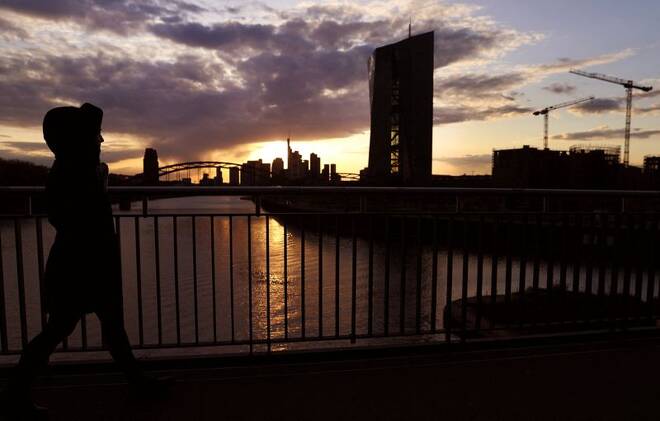Advertisement
Advertisement
Weak euro zone data point to cracks in recovery as inflation lingers
By:
BERLIN (Reuters) - Investor morale in the euro zone fell unexpectedly in March for the first time since October, dragged down by a decline in expectations as the usual spring revival of the economy is in danger of being short-circuited, a survey showed on Monday.
By Balazs Koranyi
FRANKFURT (Reuters) -The euro zone’s economic recovery is tentative and fragile, several indicators suggested on Monday, adding to signs that even if a recession may have been avoided, no upturn is in sight.
Surging energy prices and borrowing costs have weighed on business morale, investment spending and consumer confidence in the bloc for months – and, notwithstanding a dip in January, inflation remains stubbornly high while more interest rate hikes are on the horizon.
Some economic readings have been better than feared, particularly through the winter, but Monday’s retail trade data, a key sentiment indicator, and construction figures tempered any nascent optimism.
Euro zone retail sales, a good proxy for consumer demand, rebounded much less than expected in January, challenging other data, including PMI surveys, which pointed to a steady recovery.
Retail sales rose 0.3% on the month, below the 1% rise forecast by economists, and were down 2.3% year on year.
That suggests “a weak start to the year for the consumer amid stubbornly high prices,” ING economist Bert Colijn said. “While surveys about the first quarter have been relatively upbeat so far, these sales data don’t give much evidence that a rebound has started.”
Data last week showed that inflation in Germany, France and Spain – three of the bloc’s top four economies – unexpectedly rose in February.
Stagnation phase at best?
Adding to the downbeat news, Sentix’s index, a key indicator of investor morale, fell unexpectedly in March for the first time since October, dragged down by a decline in expectations.
The index fell to -11.1 points from -8.0 in February, well under economists’ expectation for a rise to -6.3.
An index on the current situation rose for the fifth month running, but it stayed below zero, indicating the economy is at best in a stagnation phase, the survey showed.
That “could soon turn into renewed recession worries if the negative economic expectations materialize,” said Sentix Managing Director Manfred Huebner in a statement.
Monday’s S&P Global euro zone Construction PMI offered mildly positive news from that sector.
However, while the reading rose to a nine-month high of 47.6 in February from 46.1 in January, it stayed below the 50 mark that separates expansion from contraction.
Economic growth and business confidence is also being held back by rising borrowing costs and increasing caution from commercial banks, who are lending more selectively.
That is not about to change.
The European Central Bank is hiking rates at the fastest pace on record, and its chief economist Philip Lane said on Monday that the bank is still likely to keep raising them after a 50 basis point increase this month.
“The current information on underlying inflation pressures suggests that it will be appropriate to raise rates further beyond our March meeting,” Lane said in a speech in Dublin, confirming market expectations for more moves through the spring and possibly the summer.
(Additional reporting by Rachel Moore, Jan Strupczewski and Francesco Canepa; editing by John Stonestreet)
About the Author
Reuterscontributor
Reuters, the news and media division of Thomson Reuters, is the world’s largest international multimedia news provider reaching more than one billion people every day. Reuters provides trusted business, financial, national, and international news to professionals via Thomson Reuters desktops, the world's media organizations, and directly to consumers at Reuters.com and via Reuters TV. Learn more about Thomson Reuters products:
Latest news and analysis
Advertisement
